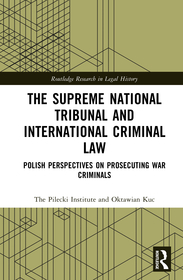
The Supreme National Tribunal and International Criminal Law
Polish Perspectives on Prosecuting War Criminals
Series: Routledge Research in Legal History;
- Publisher's listprice GBP 145.00
-
69 273 Ft (65 975 Ft + 5% VAT)
The price is estimated because at the time of ordering we do not know what conversion rates will apply to HUF / product currency when the book arrives. In case HUF is weaker, the price increases slightly, in case HUF is stronger, the price goes lower slightly.
- Discount 10% (cc. 6 927 Ft off)
- Discounted price 62 346 Ft (59 378 Ft + 5% VAT)
Subcribe now and take benefit of a favourable price.
Subscribe
69 273 Ft

Availability
Not yet published.
Why don't you give exact delivery time?
Delivery time is estimated on our previous experiences. We give estimations only, because we order from outside Hungary, and the delivery time mainly depends on how quickly the publisher supplies the book. Faster or slower deliveries both happen, but we do our best to supply as quickly as possible.
Product details:
- Edition number 1
- Publisher Routledge
- Date of Publication 26 November 2025
- ISBN 9781041004721
- Binding Hardback
- No. of pages322 pages
- Size 234x156 mm
- Language English
- Illustrations 9 Illustrations, black & white; 6 Halftones, black & white; 3 Line drawings, black & white; 1 Tables, black & white 700
Categories
Short description:
This book examines the establishment, operation, and legacy of Poland’s special post-war court created to prosecute leading German war criminals.
MoreLong description:
This book examines the establishment, operation, and legacy of Poland’s special post-war court created to prosecute leading German war criminals. Between 1946 and 1948, it conducted seven seminal landmark trials involving 49 defendants, including notorious figures such as Arthur Greiser, Amon Goeth, Rudolf Hoess, and members of the Auschwitz staff. The Tribunal aimed to foreground the Polish experience within the international discourse on post-war justice, offering a judicial account of the suffering endured under Nazi occupation. Simultaneously, it illuminated the singularity of the Jewish tragedy, with some proceedings arguably constituting the earliest Holocaust trials. This monograph situates the Tribunal within the broader context of international criminal justice, with the Nuremberg Trial as its central reference point. Interwoven at multiple levels, these proceedings reflect a complex tapestry of legal responses to mass atrocity. Despite operating under the growing pressures of Stalinisation, the Tribunal retained a notable degree of independence and upheld elements of fair trial standards—rooted in the legal traditions of interwar Poland. Its jurisprudence may be considered an early contribution to the evolution of international criminal law, offering a distinct national perspective within the wider legal and historical framework. The book will be an invaluable resource for academics and researchers working in the areas of Legal History, International and Criminal Law, History, Genocide Studies and Holocaust research, International Relations, Criminology and Criminal Justice, War Crimes Trials, Slavic and Eastern European Studies.
MoreTable of Contents:
Introduction; 1. Prosecuting German War Criminals after World War II; 2. Creation and Operations of the Supreme National Tribunal Chapter 3. Trials before the Supreme National Tribunal Chapter; 4. The German War and Occupation in the Polish Judicial Narrative Chapter; 5. The Nuremberg Trial and the Supreme National Tribunal Chapter; 6. Key Legal Issues before the Supreme National Tribunal; Conclusion.
More



